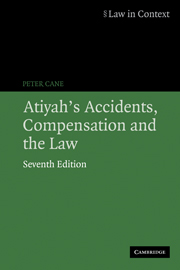Book contents
- Frontmatter
- Contents
- Preface
- List of abbreviations
- List of tables
- Table of legislation
- Table of cases
- Part One The Issues in Perspective
- Part Two The Tort System in Theory
- Part Three The Tort System in Operation
- Part Four Other Compensation Systems
- Part Five The Overall Picture
- 15 A plethora of systems
- 16 The cost of compensation and who pays it
- 17 The functions of compensation systems
- Part Six The Future
- Index
15 - A plethora of systems
Published online by Cambridge University Press: 05 June 2012
- Frontmatter
- Contents
- Preface
- List of abbreviations
- List of tables
- Table of legislation
- Table of cases
- Part One The Issues in Perspective
- Part Two The Tort System in Theory
- Part Three The Tort System in Operation
- Part Four Other Compensation Systems
- Part Five The Overall Picture
- 15 A plethora of systems
- 16 The cost of compensation and who pays it
- 17 The functions of compensation systems
- Part Six The Future
- Index
Summary
The concept of over-compensation
The question we must now ask is how the various systems for providing compensation and monetary benefits to disabled people fit together. Where a person is entitled to payments from two different sources (or‘compensation systems’), three principal alternatives present themselves. First, the person may be allowed to receive and keep money from both systems so that in the result they receive more than either system alone allows. This is sometimes called ‘cumulation’. Secondly, the person maybe allowed to receive compensation from one source only, and in this case it will be necessary to decide which that source will be. Thirdly, the person may be entitled to receive a particular amount (perhaps the larger of the two amounts on offer) partly from one source and partly from the other.
Where a person receives money payments from more than one source, they may receive more than is necessary to achieve the purpose that either of the payments is designed to serve. For example, if both payments are designed to replace lost income, a person who receives a payment from both sources may receive more in compensation than has been lost in earnings. Such over-compensation, as we might call it, appears, prima facie, to be a wasteful use of resources. Although there are some circumstances – discussed below – in which over-compensation may appear unobjectionable, it seems a reasonable starting point to assume that money spent on over-compensating people could be better spent on other things.
- Type
- Chapter
- Information
- Atiyah's Accidents, Compensation and the Law , pp. 377 - 394Publisher: Cambridge University PressPrint publication year: 2006

